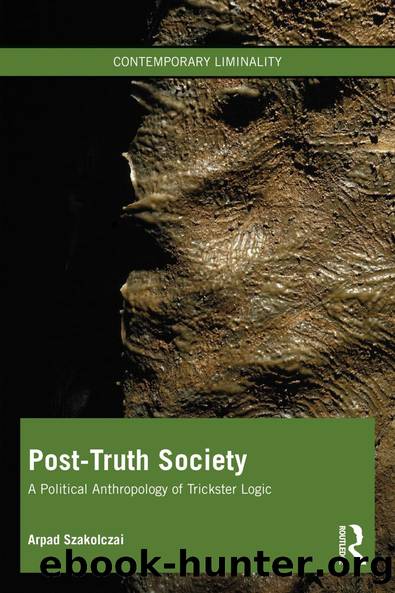Post-Truth Society by Arpad Szakolczai

Author:Arpad Szakolczai [Szakolczai, Arpad]
Language: eng
Format: epub
Tags: Social Science, Sociology, Social Theory
ISBN: 9781000506112
Google: 4nJKEAAAQBAJ
Publisher: Routledge
Published: 2021-11-29T01:01:25+00:00
Demonic painting
For the Greeks, artists have a special inspiration, which they attributed to the Muses. According to Plato, such inspiration is daimonic, implying mediation between the human and divine realms. For Picasso, such inspiration was rather demonic, as he conceived of painting as an inner struggle against the very features of painting (121â2, 262).
This is revealed in his attitude to beauty. While occasionally he laments the loss of that tradition (68â9), he rather conceives himself as its very destroyer: there is no such thing as beauty, that is just a matter of preference (257), part of those imposed limits he tries to break out (118â9). While painting is all about form, and not the object (35), this form itself must be destroyed (Richardson 1996: 165), conceiving of his aim as the fracturing of form (2007: 14), a main reason why he had of himself the self-image as the ârebel leader of modern artâ (18). Art must be subversive (Gilot and Lake 1966: 193), audacious and unique: ânot simply new, but stripped down and laceratingâ, as âpainting is a dramatic action in the course of which reality finds itself split apartâ (51). The issue at stake was not simply to go beyond realism, but to secure an equal standing for the painting in reality (71), an undertaking at the point of intersection between art according to Gell and trickster logic: â[w]e didnât any longer want to fool the eye; we wanted to fool the mindâ (72), by escalating the experience of strangeness and alienation. In the same spirit Picasso emphasised the arbitrary character of painting, the need to transcend and not obey nature, thus focusing on contrast and not on beauty (264). A crucial part of this is to confuse proportions or ratio, e.g., by a gigantism emphasising the disproportionality of parts (Richardson 2007: 29).4 In sum, the task he brought on himself was âto wrestle the whole tradition of European art to the groundâ (1992: 474), in particular with Maids. And even this is not enough, as the aim is to destroy the Mediterranean â to destroy âeverything we are todayâ (Gilot and Lake 1966: 192) â only to continue with the destruction of modern art itself, once the old has already been destroyed (Richardson 2007: 307â8).
The sources of such destructive art are the most extreme forms of negativity: a painting must be made â âout of nothingâ â (Gilot and Lake 1966: 216). This is because art is sacred, though not in the sense of beauty, grace or religion, rather in the sense of âa magic purposeâ, best revealed â in his own words â by â âNegro artâ â, which he defines through an astonishing parallel between the ancient tribal African and modern Gnostic world visions: â âas a kind of mediation between themselves and the unknown hostile forces that surrounded them, in order to overcome their fear and horrorâ â, or â âbetween this strange, hostile world and us, a way of seizing the power by giving form to our terrors as well as our desiresâ â (257).
Download
This site does not store any files on its server. We only index and link to content provided by other sites. Please contact the content providers to delete copyright contents if any and email us, we'll remove relevant links or contents immediately.
| Anthropology | Archaeology |
| Philosophy | Politics & Government |
| Social Sciences | Sociology |
| Women's Studies |
Nudge - Improving Decisions about Health, Wealth, and Happiness by Thaler Sunstein(7706)
The Fire Next Time by James Baldwin(5442)
iGen by Jean M. Twenge(5415)
Adulting by Kelly Williams Brown(4574)
The Sports Rules Book by Human Kinetics(4386)
The Hacking of the American Mind by Robert H. Lustig(4382)
The Ethical Slut by Janet W. Hardy(4251)
Captivate by Vanessa Van Edwards(3839)
Mummy Knew by Lisa James(3691)
In a Sunburned Country by Bill Bryson(3542)
The Worm at the Core by Sheldon Solomon(3487)
Ants Among Elephants by Sujatha Gidla(3467)
The 48 laws of power by Robert Greene & Joost Elffers(3291)
Suicide: A Study in Sociology by Emile Durkheim(3022)
The Slow Fix: Solve Problems, Work Smarter, and Live Better In a World Addicted to Speed by Carl Honore(3009)
The Tipping Point by Malcolm Gladwell(2921)
Humans of New York by Brandon Stanton(2873)
Get What's Yours for Medicare: Maximize Your Coverage, Minimize Your Costs by Philip Moeller(2728)
Handbook of Forensic Sociology and Psychology by Stephen J. Morewitz & Mark L. Goldstein(2705)
